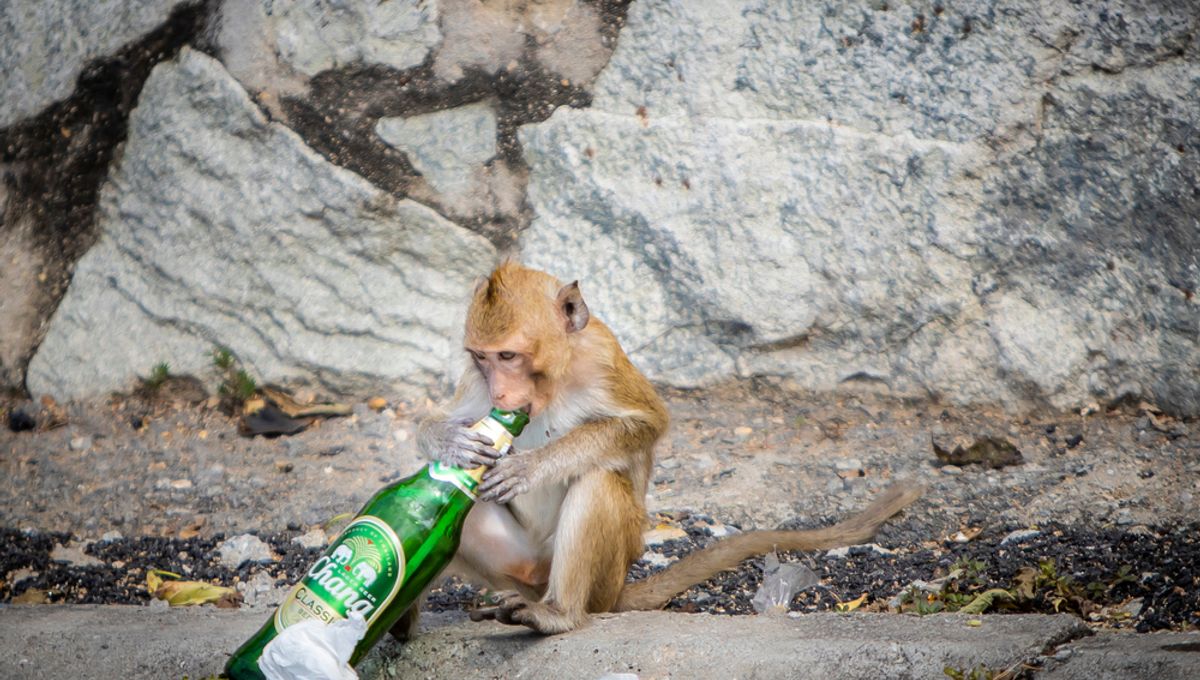
You might assume that taking drugs is a uniquely human behavior, but there are many members of the animal kingdom that go out of their way to fill their brains with psychotropic substances with the apparent aim of distorting their perception of reality. Getting on it, as scientists like to call it, is a ubiquitous trait of life on planet Earth.
Lions love catnip too
It will be no surprise to cat owners that their pets will go crazy for catnip. The harmless high – which only affects around two-thirds of domestic cats – usually lasts less than 30 minutes and will result in the cat experiencing bursts of hyperactivity, spacing out, purring, erratic behavior, and drowsiness. Basically, it’s normal cat behavior turned up a notch.
It doesn’t just give felines a high but also helps to ward off troublesome insects like mosquitos, suggesting their proclivity for the plant has some evolutionary benefit.
It’s known that this leafy plant also has a mind-altering effect on other felines, including lions, leopards, and jaguars.
Catnip (Nepeta cataria) is a herb from the mint family that owes its trippy properties to nepetalactone. Entering through the nose, the compound works on the cat’s opioid system, a bit like heroin and morphine do in people.
Trippy Skippy: The wallaby opium crisis
Speaking of heroin, opium use is a big problem for Wallabies in Australia.
Tasmania is the world’s largest producer of legally grown opium for the pharmaceutical industry, meaning the island is packed with poppy farms. Unfortunately, wild wallabies have been known to break into the fields, munch on the flowers, and get stoned.
“We have a problem with wallabies entering poppy fields, getting as high as a kite and going around in circles,” Lara Giddings, Tasmania Attorney-General, told a budget hearing in 2009.
“Then they crash,” added Giddings. “We see crop circles in the poppy industry from wallabies that are high.”
Pass the pufferfish
It’s often said that dolphins, along with humans, are some of the only animals to have sex for recreation as well as procreation. However, sex isn’t their only vice.
The BBC documentary “Dolphins: Spy in the Pod” showed how groups of Bottlenose dolphins use puffer fish to get a buzz.
The high is thanks to a neurotoxin known as tetrodotoxin that the puffer fish use as venom to stun prey. While this potent toxin can prove deadly, small amounts of it appear to have a narcotic effect.
“This was a case of young dolphins purposely experimenting with something we know to be intoxicating. After chewing the puffer gently and passing it round, they began acting most peculiarly, hanging around with their noses at the surface as if fascinated by their own reflection,” Rob Pilley, a zoologist who also worked as a producer on the series, told The Sunday Times in 2013.
Drunken monkey hypothesis
There’s a theory that humans picked up their taste for booze due to ancient primate ancestors that dined out on overly ripe fruit that had fermented and produced ethanol. Even today, it’s notable that alcohol-drenched fruit is still actively foraged by many primates, including the black-handed spider monkeys of Panama.
The so-called “drunken monkey” hypothesis was first proposed by Professor Robert Dudley of the University of California at Berkeley. He argued that primates may have learned to sniff out fermented fruits tens of millions of years ago. Since ethanol produced by fermented fruit is a relatively light molecule that easily drifts in the wind, the primates learned to link the smell of alcohol with food.
Perhaps, Dudley suggested, this ancient relationship with ethanol partially explains why modern-day humans have a tendency to overindulge and abuse alcohol too.
Drunk Dumbo
Monkeys aren’t the only animal that will actively go out of their way to consume alcohol. Elephants are also famously big drunks.
There’s plenty of anecdotal and historical literature describing elephants that have become intoxicated. There’s an old legend that Buddha himself had to tame a drunken elephant that was raising hell in a small Asian village.
In 1984, a study looked to scientifically confirm elephants’ inclination for alcohol. Scientists gathered three Asiatic elephants and seven African elephants then presented them with an array of beverages with varying alcohol content.
They found that the elephants “readily drank a 7 percent alcohol solution in quantities sufficient to produce dramatic behavioral changes.”
The test subjects didn’t seem overly drunk, but there was some suggestion that they were pleasantly chilled out by the experience.
“Although the elephants here did not appear overly ‘intoxicated’ or ‘drunk,’ the frequency and/or duration of specific behaviors changed dramatically. Initially, ear flapping increased, suggestive of an increase in body temperature. However, both drinking and bathing, which normally increase when elephants are hot and uncomfortable, decreased,” the study authors wrote.
Source Link: Humans Aren't The Only Animal That Love To Get High On Drugs